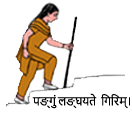Music Therapy (MT) aims at bringing positive changes in behavior and well-being. It is based on the assumption that human beings have an inborn ability to appreciate and respond to music. Music has been an integral part of Indian culture dating from Samveda. Ayurveda, too, has described treatment with songs and musical instruments in certain disease conditions. MT appears to be gaining ground in India, although there are hardly any facilities for formal training.
Music is a universal language. One doesn't need to understand music to gain the positive effects of music therapy. The therapy can be passive (listening) or active (individual or group performance). It appears that there are cultural differences in music preference. Indian music needs to be studied from this perspective. It is claimed that ragas such as Ahirbhairav, Bhairavi, Kalyan, Hindol, Jayajayawanti, and Gunakali are helpful in arthritic conditions. Percussion music (Tabla, drum, Dholak, etc.) is used for patients with depression. In contrast, instruments such as Sitar, Flute, Santoor, Guitar, and vocal music can be played for excited and anxious individuals.
There is no harm whatsoever in listening to music for the relief of pain. Music releases endorphins and other substances from the brain, leading to changes in heart rate, respiration, and blood pressure. Psychological aspects are important in any chronic pain. Many conditions such as fibromyalgia are classified as psychosomatic diseases. Music therapy can be used in fibromyalgia, regional pain syndromes, and arthritis to reduce the severity of pain and improve quality of life. Elders with osteoarthritis showed a significant reduction of pain on listening to music for 20 minutes/day in a controlled study. In another study, music reduced pain and depression scores by 12-25% in osteoarthritis, degenerative joint disease, herniated disc, rheumatoid arthritis, and fibromyalgia.
Music therapy is not just playing prerecorded music. A therapist needs to understand psychology, medicine, and music as well. Music therapy is in a nascent stage in India. However, it is recognized as an alternative and complementary therapy in Western countries. For example, 15% of hospitals in the U.S. have departments of music therapy.
